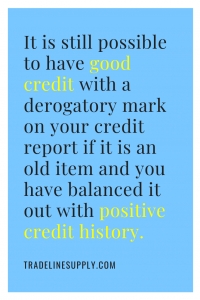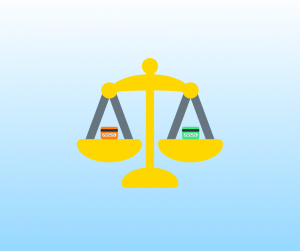What Is a Derogatory Item on Your Credit Report?

How to Use a Windfall to Improve Your Finances
05/20/2024
Credit Mix: Do You Need to Care About Types of Credit? [Infographic]
06/06/2024 Derogatory items on your credit reports can be a big problem for your finances. These negative marks can stay on your credit reports and damage your credit scores for several years.
Derogatory items on your credit reports can be a big problem for your finances. These negative marks can stay on your credit reports and damage your credit scores for several years.
Fortunately, there are some things you can do to avoid getting derogatory marks as well as to reduce the damage if you do end up with negative items on your credit reports.
We’ll help you understand minor and major derogatories, how derogatory items affect your credit scores, and what you can do about them.
What Is a Derogatory Credit Item?
The word derogatory means negative, so a derogatory credit item is a negative item on your credit report.
Derogatory items hurt your credit score and can impact your chances of getting approved for credit.
Examples of negative items on your credit report include late payments, collections, foreclosures, bankruptcies, and more, which we’ll discuss in more detail below.
There are two types of derogatory items: minor derogatories and major derogatories.
Minor Derogatory Items
A minor derogatory is a payment that was past due, either 30 days late or 60 days late. If, after the 30- or 60-day missed payment, you paid the bill and brought the account current, then it is considered a minor derogatory mark. However, if you are currently 30 to 60 days late, it is considered a major derogatory, which we will discuss below.
30 Days Past Due
Lenders cannot report your account as late to the credit bureaus until 30 days have elapsed since the missed due date, so if you pay your bill anywhere between one to 29 days after the due date, you should not see a derogatory item added to your credit reports.

However, your lender may charge a late fee, so it’s still best to pay all your bills on time. If you’ve never been late on the account before, you can contact your lender and see if they will waive the late fee for the accidental late payment. Many lenders are willing to do this for account holders that otherwise have good records. Unfortunately, if you have a promotional interest rate, you will most likely forfeit the promotional rate if you miss a payment, even if you were only a few days late.
Regardless of the lender’s policies regarding late payments, remember that if you do miss a due date, you can prevent a negative item from hitting your credit reports by paying the bill before the 30 days are up.
60 Days Past Due
If you miss your due date twice in a row and become 60 days late, the situation becomes more serious. At this point, the credit card issuer can hit you with a penalty APR of up to 29.99%.
Not only will this high interest rate apply to all your purchases for at least the next six billing cycles, but in this case, the bank is also allowed to apply the penalty rate to your existing balance as well. Not all credit cards have penalty APRs, however, so check the terms of your card to see if you could be subject to one.
Thankfully, “universal default” is a thing of the past—the practice of credit card companies raising consumers’ interest rates if they were late on any loan with any lender was banned by the Credit Card Act of 2009.
In March of 2024, The Consumer Financial Protection Bureau capped credit card late fees as part of the Biden administration’s fight against junk fees.
Major Derogatory Items

A major derogatory credit item is typically defined as an account that has been 90 days past due or more. If you have a major derogatory on your credit report, that is a huge red flag to lenders, and it may hinder you from being able to qualify for credit.
Other examples of major derogatory credit items include:
- Charge-offs—This is when a creditor writes off your account as a loss because you are so delinquent on the debt that they assume you are unlikely to ever pay them back. This typically happens after six months have passed without payment.
- Collections—After your account has been charged off by the lender, they may try to regain a portion of their losses by selling the account at a discount to a debt collector, who then becomes the owner of the debt and will try to collect the funds from you.
- Court judgments—A judgment is when a lender or debt collector sues you over an unpaid debt and the court orders you to repay it. A court judgment gives the lender or debt collector more powerful options to collect the money you owe them, such as garnishing your wages or putting a lien on your home.
- Repossessions—This is when the lender takes back possession of collateral property such as your car or house because you defaulted on the loan.
- Foreclosures—Foreclosures happen when you become so delinquent on your home loan that the bank retakes possession of the home and tries to recover the balance of the loan by selling the property.
- Settlements—A settlement is an agreement between you and your lender that you will pay back part of the debt you owe them. Once you have paid the settlement amount, the lender will stop trying to collect more money from you and will consider the account settled. However, since you did not pay the full amount you owed, a settlement is reported as a derogatory item on your credit reports.
- Short sales—A short sale is a type of settlement where the lender agrees to sell the property for less than the amount owed on your mortgage.

- Public records—Public records such as delinquent taxes, liens, unpaid alimony, and unpaid child support, are derogatory items that used to be severely damaging to your credit, especially if there was still a balance owed. However, the National Consumer Assistance Plan, implemented in 2017, enacted stricter requirements for public records to appear on credit reports. As a result, some public records, like civil judgments and tax liens, are no longer included in credit reports because they do not meet the new requirements. According to credit.com, “At this point, the only derogatory public record that should appear on your credit report is bankruptcy. If a tax lien or civil judgment still appears on your credit report, you should dispute that record with the credit reporting agencies.” Although most public records will no longer appear on your credit reports and will therefore not affect your credit scores, they may still affect your chances of qualifying for credit if a lender looks up your public records.
- Bankruptcy—Filing bankruptcy means you are asking to be legally released from paying back some or all of your debts. Because of this, and because it usually affects several of your credit accounts, not just one, it is the most damaging derogatory item to your credit. It will almost certainly devastate your credit score and reduce your chances of getting approved for credit for a significant amount of time, although it is possible to recover from bankruptcy eventually.
How Do Derogatories Affect Your Credit Score?
As you may have guessed, any derogatory mark on your credit report can seriously damage your credit score. However, they do not affect every individual or situation equally. There is no predetermined amount of points associated with any given credit action.
Here’s how credit expert John Ulzheimer described it in an article on The Simple Dollar:
“There is no fixed value to any derogatory entry. Their value is always relative to the presence or absence of other similar derogatory entries on a credit report. So, the answer to the question ‘how much?’ varies from ‘not at all’ to ‘a whole lot’—and everything in between.”
In other words, the effect of a derogatory account could range from a significant drop in your credit score to potentially no difference in your credit scores at all. It depends on what else is already in your credit file and the severity of the derogatory information.
A bankruptcy, which is the worst type of derogatory item you can have, may result in your FICO score dropping more than 200 points, according to credit.com. It can also affect your credit scores for up to seven to 10 years, at which point it is finally removed from your credit report. (A Chapter 7 bankruptcy stays on your credit reports for 10 years, while a Chapter 13 bankruptcy stays on your credit reports for seven years.)
For those who have pristine credit records, even one 30-day late payment, a minor derogatory item, can do serious damage to their credit scores. For individuals who already have some negative items on your reports, additional derogatory entries won’t have as big of an impact.
Derogatory items will also have a larger impact on those with thin credit files or short files because they do not have very much positive credit history to help soften the blow of a negative item. In contrast, those with thicker files or longer credit histories will have more positive history to help balance out any negative marks.

Credit Scoring Buckets
Another complication is the concept of credit scorecards or “buckets,” which score groups of consumers differently based on certain characteristics of their credit profile.
As a hypothetical example, there could be a scorecard for consumers with no major derogatories and a different scorecard for consumers with one major derogatory. In this case, getting your first major derogatory mark would put you on a different scorecard, wherein your score would be calculated using a different algorithm.
While the impact of a derogatory item varies from person to person depending on their unique individual credit history, one thing we do know for sure is that derogatory accounts become less impactful to your credit as time passes.
In fact, it is still possible to have good credit even with a derogatory mark on your credit report, particularly if it is an old item and you have balanced it out with positive credit history over time.
How Late Payments Affect Your Credit Score
In terms of how bad late payments are for your credit, it’s not so bad to miss a payment on one account for one or two months, according to an article on The Balance. However, missing payments on several different accounts for one to two months will be worse for your credit. Missing a payment for three months in a row will have a similar effect as a charge-off or collection since they are all considered major derogatory items.
The Impact of a Derogatory Item May Depend on the Credit Scoring Model
VantageScore and FICO scores treat certain derogatory items differently.
When it comes to collection accounts, for example, collections that have been paid off and small-balance collections have different impacts depending on which credit score is used.
FICO 8, the most widely used type of credit score today, considers both paid and unpaid collections to be major derogatories. That’s one reason why paying off a collection account may not always increase your credit score.
In contrast, FICO 9 and VantageScore 3.0 and 4.0 disregard collection accounts altogether once they have been paid. These scoring models also assign less weight to medical collections.
FICO 8 and FICO 9 both ignore collections that had an original balance of less than $100.
Does Paying the Past-due Balance Delete the Derogatory Mark?
Unfortunately, simply bringing the account current by paying the past-due balance does not make the derogatory mark disappear. It does not negate the fact that you did not pay your bill on time, which is important information that helps determine your credit score and helps lenders decide whether they want to do business with you.
Payment history is the most important component of both your FICO scores and VantageScores for a reason. It is highly predictive of how much of a credit risk you represent to lenders. For that reason, accurate derogatory information must stay on your credit report even after you have caught up on payments.
However, it can still be beneficial to pay off the derogatory items on your credit report. Experian says, “While paying off a derogatory account won’t automatically remove it from your credit history, it will be updated to show it has been paid, and lenders may view a paid derogatory more favorably than an unpaid one.”
How to Minimize the Credit Score Impact of a Derogatory Item

Although bringing an account current will not remove the negative information from your credit report, it is still a good idea. If you had a late payment in the past but have since caught up, that is better for your scores than currently being delinquent.
Moving forward, do your best to make sure you’re not late again. Maintaining a positive credit history from now on is the most important thing you can do to minimize the effect of a derogatory item and restore your credit health.
Once you have done all you can to mitigate the damage of a derogatory item, it simply becomes a matter of waiting until the negative mark ages off your credit report.
How Long Can Derogatory Credit Items Stay on Your Credit Report?
In general, derogatory marks can be reported for up to seven years after the account was first reported as late, which is referred to as the date of first delinquency (DOFD).

If you get a court judgment against you, however, that will remain on your credit reports for seven years after the judgment was issued, not seven years from the date you were first late on the original debt.
Certain types of accounts can stay on your credit report even longer. Depending on the type of bankruptcy, for example, a bankruptcy may remain on your credit reports for up to 10 years.
According to Experian, since a Chapter 13 bankruptcy requires you to pay some of the debts you owe, this type of bankruptcy is removed from your credit report after seven years. With a Chapter 7 bankruptcy, you don’t pay back any of the debt, so it is removed 10 years after the date of filing instead of seven years. The derogatory marks on individual accounts will still disappear seven years after the DOFD for each account; filing for bankruptcy does not affect the seven-year timeline on those accounts.
Besides a Chapter 7 bankruptcy, all other delinquencies are required by law to be deleted from your credit report after seven years. However, the impact of a derogatory mark on your credit score will decrease over time, especially if you maintain a positive credit history going forward that can help outweigh the negative items.
Removing Derogatory Credit Items From Your Credit Report
If you have inaccurate negative items on your credit report, it’s in your best interest to dispute the derogatory items on your credit report as soon as possible.
Your credit reports should have instructions on how to dispute erroneous derogatory credit items on your credit reports. The best way to dispute inaccurate negative information is to send a separate letter for each dispute via certified mail, along with any accompanying evidence that is needed to verify the validity of your claim.
Make sure to dispute the derogatory items on your credit report with the credit bureaus as well as the creditor that is furnishing the data.
You can read more about how to dispute inaccurate derogatory items in our article, “How to Fix the Most Common Credit Report Errors.”
Should You Write a Letter Explaining Derogatory Items on Your Credit Report?

A letter of explanation is a letter that you write to a lender explaining the reason for negative marks on your credit report. This may be required by your lender when you apply for a mortgage, particularly when applying for a home loan that is subsidized by the government, such as an FHA loan or VA loan.
Your mortgage lender needs to be certain that you will be able to pay off your home loan. They will want to understand the circumstances of any derogatory items on your credit report in order to determine whether you have learned from your mistakes and taken steps to improve your situation or whether you may still be at risk of defaulting on a loan in the future.
A good letter of explanation should be truthful, clear, and detailed. If there were extenuating circumstances that led to you falling behind on your bills, explain what happened and how you resolved the problem. As with a credit report dispute, be sure to include documentation that supports your story along with your letter of explanation. Try looking up sample letters of explanation online if you need help getting started.
How to Avoid Getting Derogatory Marks on Your Credit Report
Since accurate and timely derogatory information can’t legitimately be removed from your credit report, the best strategy is to prevent them from happening in the first place.
Here are some tips to help you keep your credit in the clear.
- To ensure you never miss a payment, set up automatic payments for all your loans and credit cards. Keep an eye on your accounts and make sure the payments are going through.
- As an additional precaution, set up notifications that alert you when your statement is available and when your due date is coming up. Knowing exactly when your bill is due and how much you need to pay will allow you to make sure that you have sufficient funds in your bank account to make the required payments.

- If you are in a period of financial difficulty and can’t afford to make the minimum payment, contact your creditor and try to work out an arrangement with them to temporarily reduce or defer payments. Ask if they offer financial hardship options.
- If you accidentally miss a payment but usually pay on time, bring the account current by making the payment as soon as possible. If you pay before 30 days have passed since your original due date, you can avoid getting a derogatory mark reported to the credit bureaus. If you’re 30 to 60 days late when you catch up, you’ll have a minor derogatory on your credit report, but not a major derogatory. Try your best to pay before the account becomes 90 days past due, at which point it will count as a major derogatory.
- Regularly check your credit reports for derogatory items that don’t belong to you so you can dispute errors and have them removed from your credit report.
Conclusions
Having derogatory items on your credit reports, particularly major derogatories, can be highly damaging to your credit for a long time. If there are derogatory items in your past, balance out the negative effects by adding positive payment history going forward and use smart credit strategies to avoid getting derogatory marks in the future.








2 Comments
I really liked this post! I read your blog frequently
and you are always releasing some great information. I’ll be sure to share this on my Facebook page and
my followers should like this also. Keep up the good work!
I’m surprised that a derogatory item would be on my credit report.